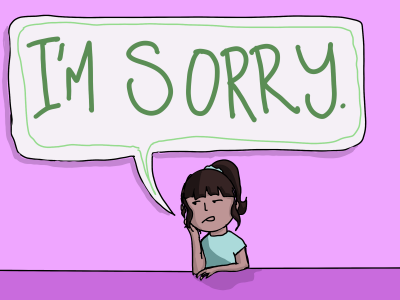Apologizing is something we all do — or at least hope we can muster up the courage to do. In fact, it is an act that is seen as being polite or the “bigger person.” But I’ve found lately that there is actually a point where you can apologize too much — and this is a phenomenon especially prevalent among women.

Whether it’s myself, my friends or the girls I eavesdrop on in passing, I can distinctively make out the all-too-familiar “I’m sorry my hair is such a mess”, “I’m sorry I’m being so loud” and “I’m sorry I look like this” statements.
And it’s not because the meaning of “I’m sorry” just becomes null and void. By contrast, it does the opposite. When we apologize too much — especially when it comes to things like our appearance and personality — we indirectly diminish our self worth to our exterior depiction.
I like to call this nasty habit the “I’m sorry” complex, and it’s something so many of us are guilty of partaking in. This excessive apologizing is almost biologically ingrained in most women’s vocabulary — even to the point where we don’t even notice how frequently the “s-word” is slipping off our tongues and into the void of excuses.
But I pose the question: Why?
Why are we sorry? What is it that we have to be apologetic for?
In some sense, the phrase comes instantaneously. We apologize for simple actions, simple words, simple thoughts. And even when we’re not saying the words outright, our body language can often give the apology for us.
Arms crossed, legs together, hands folded. Even this natural placement seems to scream, “I’m sorry for taking up space.”
But if we have to keep apologizing for our existence, we’re inevitably going to walk away from the day completely lacking any sort of self confidence.
Women are supposedly biologically wired to be nurturing and agreeable as a way to maintain harmony, and in a sense, apologizing is our primary mechanism for doing such. We aim to please, never upset, and that’s why we end up using “sorry” as a basic filler word.
Just the other day a girl in one of my classes finished off her talking point to the professor by saying, “Sorry, I hope that makes sense.”
And just hearing that simple sentence was both frustrating as it was confusing and sad to me. The reality is that she didn’t have anything to be sorry for, she probably just let the word slip out of habit. But asking a question isn’t an offense.
But the crazy thing is, this phenomenon is seldom seen in men. I’ve never really heard a boy in my class apologize for asking a question, nor do my male acquaintances ever apologize to me for their appearance.
Most of my guy friends have a naturally relaxed demeanor, but it has more to do with just general attitude. It has been scientifically proven that men apologize less than women because they have a higher threshold for what constitutes as offensive.
Not to mention, society doesn’t exactly press upon men that they have to be agreeable peacemakers to be valued — this is a stereotype that is just inadvertently attached to the hip of all women.
So ladies, HOW do we break this cycle of excessive apologizing? Like with any bad habit, we have to unlearn past ways.
I would first recommend replacing expressions of regret with those of gratitude. Use “thank you” instead of immediately jumping to “I’m sorry.”
Then there is also learning to take a compliment. Many of us struggle to take compliments because we fear coming off as overconfident, or subsequently, we leap to put ourselves down before we let others do so. Imperfections are natural, and we relinquish a great deal of power and confidence by letting them consume us.
Lastly, before you let the word slip out, I think it’s incredibly important to really think about what you consider to be a true offense. An apology is only meaningful when it is heartfelt, so when it comes to a little apology here and a little apology there — remember they mean nothing in the long run.
To exist is not an imposition. Confidence is key to getting anywhere in life, and in a society where the playing field between genders is already unleveled, it is imperative for us girls to band together and reclaim our power. Sorry not sorry!




















































































































Ariana Bruno • Sep 13, 2023 at 2:46 pm
Proud to call you my older sister! Keep up the good work. Love you always. 🙂